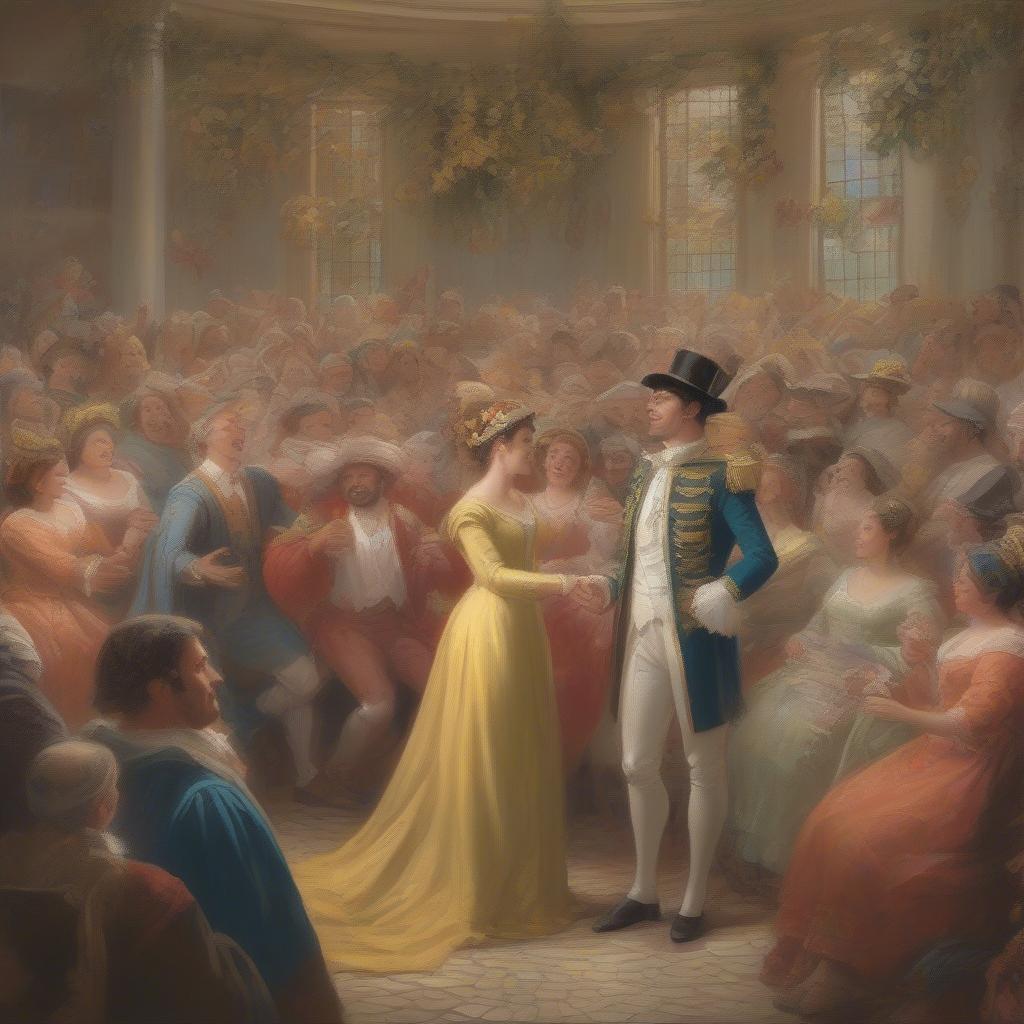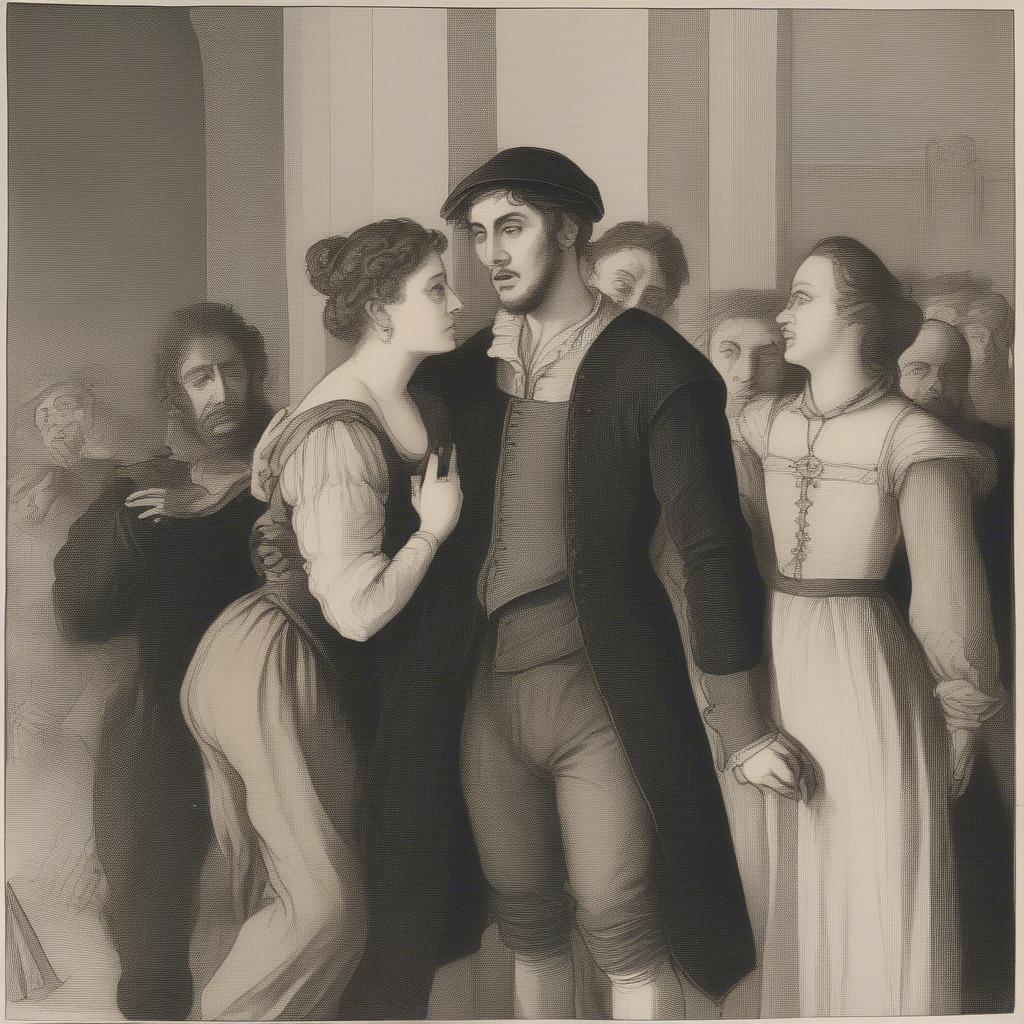Bassanio Quotes About Love offer a fascinating glimpse into the complexities of romance and desire in Shakespeare’s The Merchant of Venice. His eloquent words reveal a character driven by both genuine affection for Portia and a pragmatic desire for her wealth. This exploration delves into Bassanio’s most memorable pronouncements on love, analyzing their meaning and significance within the context of the play.
Unveiling Bassanio’s Language of Love
Bassanio, a Venetian gentleman, is portrayed as a charming and persuasive individual, particularly when expressing his feelings for Portia. His language is rich with imagery and metaphor, reflecting the passionate nature of his pursuit. However, his declarations of love are often intertwined with references to Portia’s fortune, raising questions about the true motivations behind his affections. Is he truly in love, or is he captivated by the prospect of financial security?
 Bassanio Choosing the Casket
Bassanio Choosing the Casket
One of Bassanio’s most famous quotes about love reveals this duality: “In Belmont is a lady richly left, and she is fair, and, fairer than that word, of wondrous virtues.” This statement, while acknowledging Portia’s beauty and character, also prominently highlights her wealth (“richly left”). This juxtaposition suggests that Bassanio’s desire is fueled by both love and ambition.
Deconstructing Bassanio’s Declarations of Devotion
Bassanio’s pursuit of Portia involves navigating the complex trial of the caskets. His choice of the lead casket, which ultimately wins him Portia’s hand, is accompanied by a declaration of love that emphasizes his willingness to risk everything for her. “So may the outward shows be least themselves: The world is still deceived with ornament,” he proclaims, rejecting the gold and silver caskets in favor of the humble lead. This suggests a deeper understanding of love that transcends superficial appearances.
 Bassanio and Portia's Wedding
Bassanio and Portia's Wedding
However, even in this seemingly selfless act, the shadow of financial motivation lingers. Knowing that Portia’s fortune is tied to the outcome of the casket trial, Bassanio’s choice can be interpreted as a calculated gamble, motivated by both love and the desire for wealth.
Is Bassanio’s Love Genuine?
This question remains a central point of debate among scholars and audiences. While his words are often eloquent and persuasive, his actions suggest a more complex picture. His initial reliance on Antonio’s financial backing to woo Portia raises concerns about his sincerity. Furthermore, his quick acceptance of Portia’s offer to pay off Antonio’s debt to Shylock further complicates the perception of his motivations.
Dr. Elizabeth Miller, a Shakespearean scholar, notes: “Bassanio’s love for Portia is undeniably present, but it is intertwined with a pragmatic awareness of her wealth. This doesn’t necessarily diminish his affection, but it adds a layer of complexity to his character and his relationship with Portia.”
 Bassanio, Antonio, and Portia
Bassanio, Antonio, and Portia
Bassanio Quotes and the Nature of Love in the Elizabethan Era
Bassanio’s expressions of love also provide insights into the social and cultural context of the Elizabethan era. Marriage during this time was often influenced by financial considerations, and the pursuit of a wealthy spouse was not uncommon. Bassanio’s language reflects this reality, blending romantic ideals with practical concerns.
The Role of Fortune in Love
Bassanio’s frequent references to Portia’s fortune highlight the importance of wealth and status in Elizabethan society. His words reveal the pressures and expectations surrounding marriage and the complexities of navigating love and financial security.
Dr. James Thompson, a historian specializing in the Elizabethan period, comments: “Bassanio’s language reflects the prevailing social norms of his time. While his love for Portia may be genuine, it is also influenced by the practical realities of a society where marriage and financial stability were closely intertwined.”
Conclusion: A Complex Portrait of Love
Bassanio quotes about love offer a nuanced perspective on the complexities of romance and desire in Shakespeare’s The Merchant of Venice. While his words express genuine affection for Portia, they are also interwoven with a pragmatic awareness of her wealth. This duality makes Bassanio a compelling and enigmatic character, whose motivations remain open to interpretation. Ultimately, his pursuit of Portia raises enduring questions about the nature of love, the role of fortune, and the interplay between desire and ambition.
FAQ
- What are some of Bassanio’s most famous quotes about love?
- How does Bassanio’s language reflect his character?
- What is the significance of Bassanio’s choice of the lead casket?
- How does Bassanio’s pursuit of Portia reflect the social context of the Elizabethan era?
- Is Bassanio’s love for Portia genuine?
- What are the complexities of Bassanio’s relationship with Portia?
- How do Bassanio’s quotes contribute to the overall themes of The Merchant of Venice?
Need more help understanding love and relationships? Explore these other helpful articles on DaiDuongTranhBa:
- Navigating the complexities of modern romance
- Building strong and lasting relationships
- Understanding the language of love
When you need support, please contact us via Email: contact@daiduongtranhba.com or visit our office at Michigan Ave, Suite 3100, Chicago, IL 60611, USA. We have a 24/7 customer support team ready to assist you.


